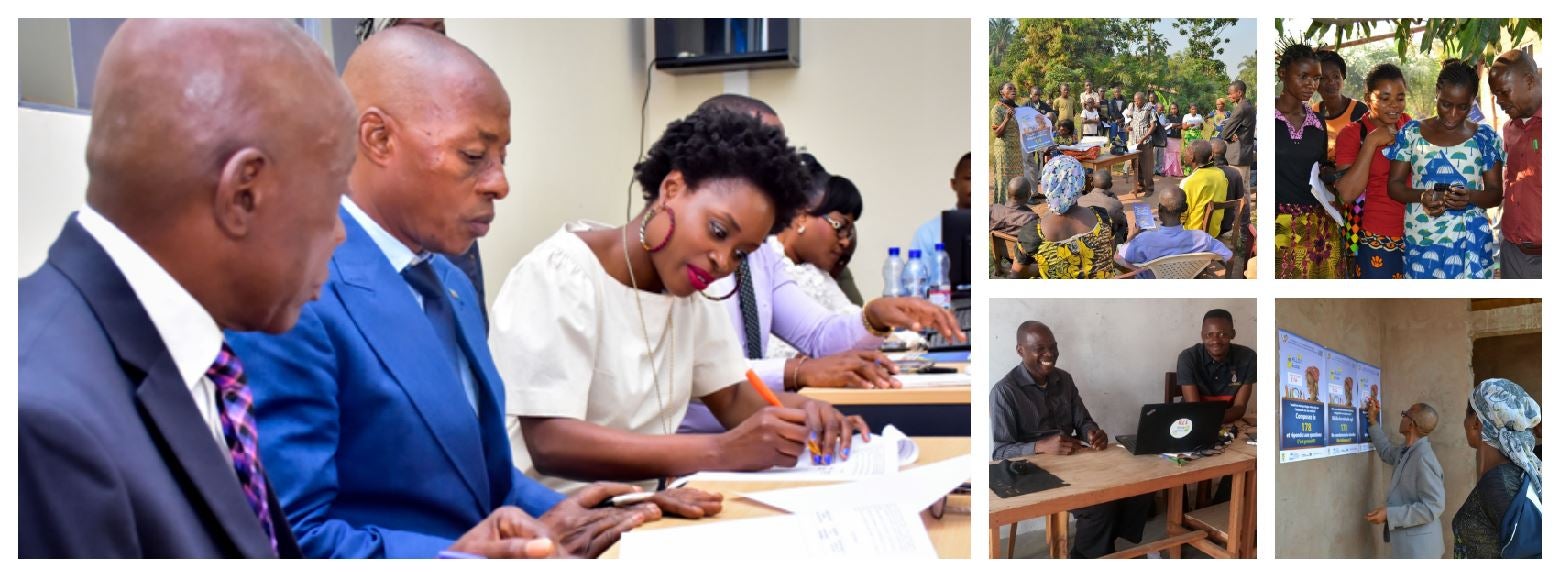
Mobile solutions for better governance in education
Let’s look at these pictures together: villagers examining a poster, teachers putting a similar poster on the wall, adding a number to it; government officials choosing designs for a dashboard with a help of a technician. None of these can be described as “cutting-edge technology” but these photos show moments in the life of a cutting-edge, disruptive project.
It’s the kind of project that works technical innovation into the lives of citizens and incentives to respond to the needs of these citizens into the workflows of government officials.
Allô, École! is a mobile platform funded by Belgian Development Cooperation and executed by the Ministry of education of the Democratic Republic of Congo (DRC), with the help of the World Bank.
Currently Allô, École! is supporting three functionalities:
Broadcasting messages from the Ministry to its provincial branches, as well as to teachers, school principals and parents. Its voice (all-important for illiterate parents) and text messages might be about the impending distribution of textbooks or school fees. DRC is a country the size of Western Europe and has extremely limited road infrastructure. The platform is riding the wave of growing mobile penetration and reducing the negative effects of time and distance by increasing interconnectedness among education stakeholders.
Sending questions/short surveys and receive answers. For example, the Ministry can send a message to its branches, listing the allowed level of fees for the school year and asking to confirm receipt. Since responses of the officials are stored on the platform, the response also serves as a de facto signature and serves as a deterrent to overcharging. Or school principals can be asked about the number of attending students vs. the number of available textbooks. Data analysis generated by the platform is then used for targeted actions and policymaking.
Asking parents to share information about schooling of their children and provide response/redress. For example, by triangulating the textbook information above, the Ministry can ask parents directly about the use of textbooks in their child’s class. The Ministry then follows up with corrective actions and closes the accountability loop.
So, how difficult it is to make accountability and communication mobile platforms work? Let’s peek into the implementation kitchen. This is a multilayered recipe, the proportions of which are both art and science. We are after a well-balanced nutritious dish, the one that would make the education system healthier.
Layer #1: Technical. Find an organization that has developed and implemented appropriate technology and adapt it, using human-centered design principles. In the case of Allô, École!: how do we design dashboards and graphics so that they are appealing and easy to use for the DRC officials? These context-specific issues in addition to the more straightforward ones, never straightforward or boring with our client the DRC: negotiate agreements with mobile providers, install a server, and obtain a short code (hence 178 in the picture above) for toll-free easy communications.
Difficult? We thought so, too. Apparently, that was the easy part. Institutional layers are yet more tricky and initially require constant stirring.
Layer #2: The architecture of “Allô, École!” outreach. Each school in the pilot receives a three-digit platform number (remember the teacher writing a number on the poster above?). Since the pilot is also a randomized controlled trial, the treatment schools receive an NGO visit, a set of posters, and a demo of the technology on a basic phone. Messages about teacher absenteeism, access to textbooks, and so on are recorded in four national languages. To inspire parents to use the platform (a dash of spice here) “famous” voices are used (what parent can resist a message recorded by the much-loved national soccer team coach urging active participation?).
So, are we done yet? We almost thought so! In the first four months, the Ministry’s Communications Department operating Allô, École! received about 8,000 calls. Passions were flying high. Parents reported insufficient textbooks, shoddy school construction, teachers out of class. Allô, École! diligently sent thank-you’s and promises of a follow up. A couple of ad hoc investigations were carried out and then… a new layer was clearly needed! The Ministry wanted the platform to signal its openness to the population but was not set up to be responsive. It liked “new” and “technical”, but needed institutional rewiring - a special sauce to penetrate all the layers and make the system incentivized and interconnected.
So, back to the kitchen…
Layer #3: The Secret Ingredient… not because we are hiding something; because we are in unchartered waters finding ways to incentivize and routinize responsiveness.
The Minister issues a decree appointing a respected senior director Coordinator of “Allô, École!”. Responsiveness is made an integral part of staff performance assessment. Dynamic young “client service” consultants are attached to each department for six months, living through the first response cycles with the ministry responders, building up their confidence in the use of technology. Protocols are developed and tested for every functionality listed above. “Allô, École!” is becoming part of the routine workflow in the Ministry.
So, time to take the dish out of the oven. The first surveys have gone out; parents’ queries are being followed up; the Ministry gets information about the situation on the ground in real time and acts on it.
Are we done?
We realize it will always be work in progress: Allô, École! is constantly changing and adapting. The first stress tests are encouraging: despite the deteriorating budget situation in the Ministry, the platform has been adjusted, its uses expanded. Allô, École! is part of an evolving ecosystem, not a pre-cooked dish!
We invite you to follow “Allô, École!” developments. We will soon feature podcasts with various stakeholders telling the implementation story from different perspectives.
We would love to hear from your experience and insights about other similar initiatives. Let’s learn from each other how to routinize disruption in our projects!


Join the Conversation